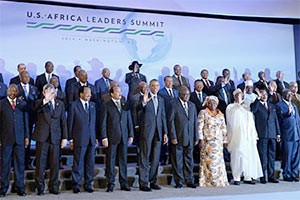US competing with China for influence in Africa
A three-day US-Africa Leaders Summit, the first such event of its kind, was held earlier this month in Washington DC.
According to the White House, the summit held from Aug. 4-6 focused on topics, such as advancing the administration's focus on trade and investment in Africa, highlighting the US's commitment to Africa's security and good governance.
During the summit, President Obama also announced US$33 billion in financial commitments aimed at improving US-Africa economic and trade ties.
The summit, that brought together 50 heads of state, along with a range of US and African civil society and business leaders, is being seen as Washington's attempt to challenge China's status in Africa.
Obama denied that the United States intends to compete with China for influence in Africa, however, he said that the relationship between the United States and China is not a zero-sum game.
Despite this, in an interview with the London-based Economist magazine, the US president said that governments should be cautious as to effect of Chinese investment in Africa, saying that the African governments can negotiate a good deal whoever they're partnering with.
During the US-Africa Leaders Summit, Obama also stated that Chinese investment in Africa is aimed at securing resources in the region. He said that any agreement aimed at acquiring access to Africa's natural resources is unlikely to benefit the African partner in the long run.
Obama advised African leaders to make sure that if China is constructing roads and bridges in their countries, it should first hire an African workforce. He also said African governments should shape how infrastructure is going to benefit them in the long term.
Africa's economy is growing faster than any other continent. Among the 20 fastest growing economies in the world over the past two decades, nine were located in Africa.
China began investing in Africa during the 1990s and replaced the United States to become the continent's largest trading partner in 2009.
Bilateral Sino-African trade has broken the US$21 billion mark, compared with US$85 billion in US-Africa trade.
Sino-African relations are at a historic high-point. High-ranking government and politicians and civic groups from China visit the continent frequently every year, allowing African countries to successfully duplicate China's development model.
The United States, on the other hand, has attached less importance to developing relations with Africa.
The United States remains the largest investor in Africa, however, and most of its capital has been invested in the development of oil and gas resources, rather than in infrastructure construction, manufacturing and economic and trade cooperation.
In an effort to catch up with the Chinese in the continent, Obama launched a Trade Africa Initiative last year.
In terms of financial aid to Africa, China insists on the principle of no interference in the internal affairs of African nations, nor does it rule out technology transfer, and it maintains there are no political conditions attached to extending financial aid to the continent.
The policies of the United States and European financial aid to Africa are mainly aimed at solving poverty-related problems, promoting sustainable development and preventing conflict.
China's efforts to cement political and economic ties with Africa have long been overstated by the West as posing a threat to the continent. US media outlets even called on Washington to contain China's ascent in Africa to protect its strategic interests in the continent.
With China's growing influence in Africa in recent years, the United States, Japan, India and the European Union have established platforms for dialogue with Africa. This has also made Beijing realize that it can protect itself from international pressure by adjusting its Africa policy through cooperation with other world powers.
It has become even more apparent that world powers will compete for resources in Africa through various means. Taiwan, which only has three diplomatic allies in Africa, should therefore think how it can use its soft power and issues relating to international aid to Africa to expand its international space.


